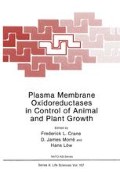Abstract
It has been established (Barr 1987,1988) that in cultured carrot cells protons are excreted from two different sources: by the action of the plasma membrane H+-ATPase, located on the cytoplasmic side of the membrane, and through plasmalemma NADH-dehydrogenase (Brightman et al., 1987,1988), a transmembrane enzyme, which transports electrons in association with protons across the plasmalemma from the cytoplasmic side toward the outside of the cell. Evidence for this comes from studies with inhibitors of the H+-ATPase and plasma membrane redox. In this study, two new inhibitors of plasma membrane redox reactions, acridine orange and neutral red, were tested on H+ excretion and growth of carrot cells. H+ excretion, potassium ferricyanide reduction, NADH oxidase and peroxidase activities were also assayed on carrot cells grown for 8 days in presence of high NaC1 concentrations (100–300 mM). It was found that acridine orange in concentrations of 3–15 µM inhibited H+ excretion from 50–85% and ferricyanide reduction 100% upon direct addition of acridine orange to carrot cells, but growing carrot cells with acridine orange in similar concentrations stimulated the H+-ATPase-generated H+ but inhibited ferricyanide reduction and associated redox H+ 100%. Carrot cell growth, NADH oxidase and peroxidase were inhibited from 80–100%. Neutral red inhibited the action of the plasma membrane H+-ATPase > 50%, and growth and associated plasma membrane redox activities from 50–100%. Growth of carrot cells on high NaCl concentrations also inhibited the H+-ATPase-excreted H+ 38% and growth, measured as dry weight of carrot cells, 66%, while plasma membrane redox functions — ferricyanide reduction, NADH oxidation and peroxidase activity gave from 90–100% inhibition. From these data it appears that H+ excretion by plasma membrane redox reactions controls H+ in some special membrane domain that is associated with carrot cell proliferation.
Access this chapter
Tax calculation will be finalised at checkout
Purchases are for personal use only
References
Barr, R., 1987, in “Electron Transport in Plasma Membranes,” J. Ramirez, ed., Publications Office CSIC, Madrid, pp. 27–40.
Barr, R., 1988, Physiologia Plantarum (in press).
Barr, R., and Crane, F. L., 1987, Plant Physiol. 83 (supplement):53 (No. 317).
Brightman, A. O. Barr, R., Crane., F. L., and Morre, D. J., 1987, Plant Physiol.(supplement):93 (No. 562).
Brightman, A. O. Barr, R., Crane., F. L., and Morre, D. J., 1987, Plant Physiol. (in press).
Author information
Authors and Affiliations
Editor information
Editors and Affiliations
Rights and permissions
Copyright information
© 1988 Springer Science+Business Media New York
About this chapter
Cite this chapter
Barr, R., Crane, F.L. (1988). Are Plasmalemma Redox Protons Involved in Growth Control by Plant Cells?. In: Crane, F.L., Morré, D.J., Löw, H. (eds) Plasma Membrane Oxidoreductases in Control of Animal and Plant Growth. NATO ASI Series, vol 7. Springer, Boston, MA. https://doi.org/10.1007/978-1-4684-8029-0_52
Download citation
DOI: https://doi.org/10.1007/978-1-4684-8029-0_52
Publisher Name: Springer, Boston, MA
Print ISBN: 978-1-4684-8031-3
Online ISBN: 978-1-4684-8029-0
eBook Packages: Springer Book Archive

